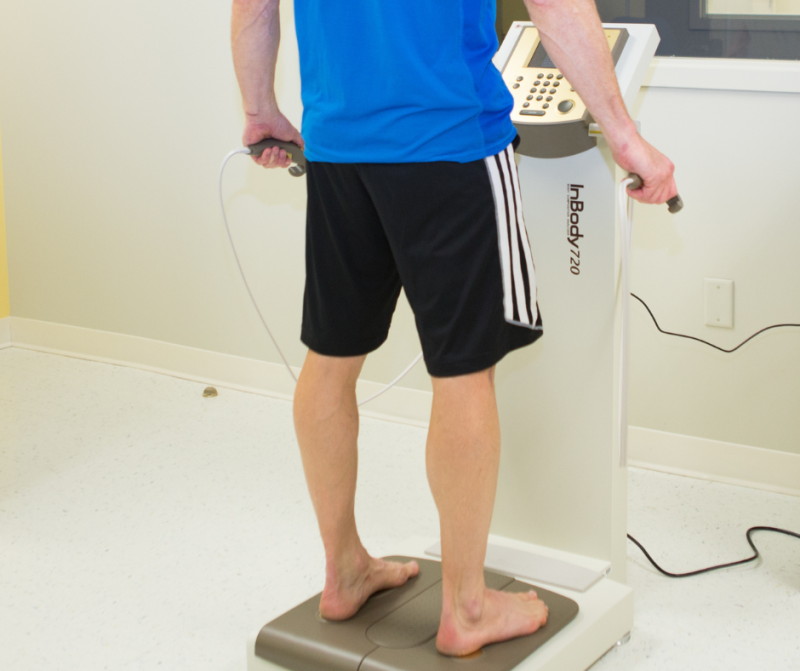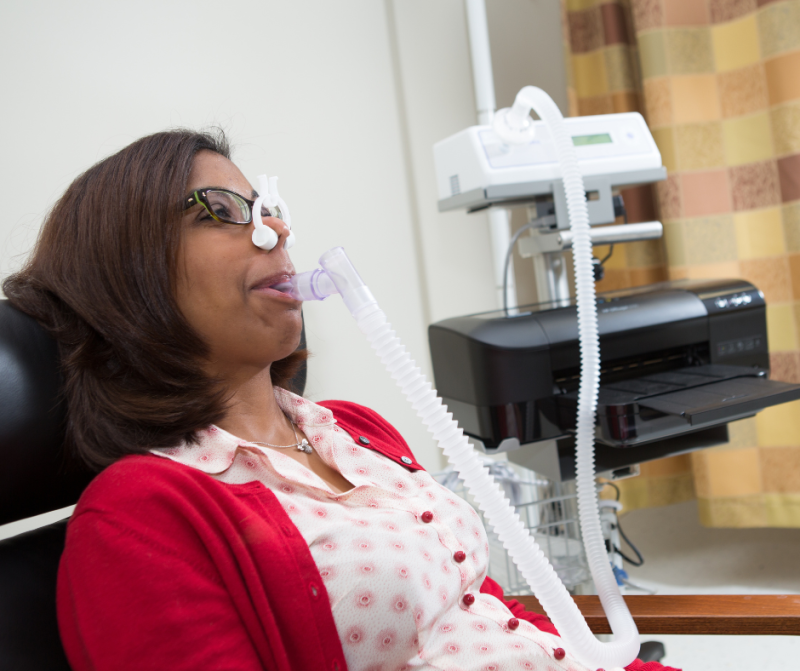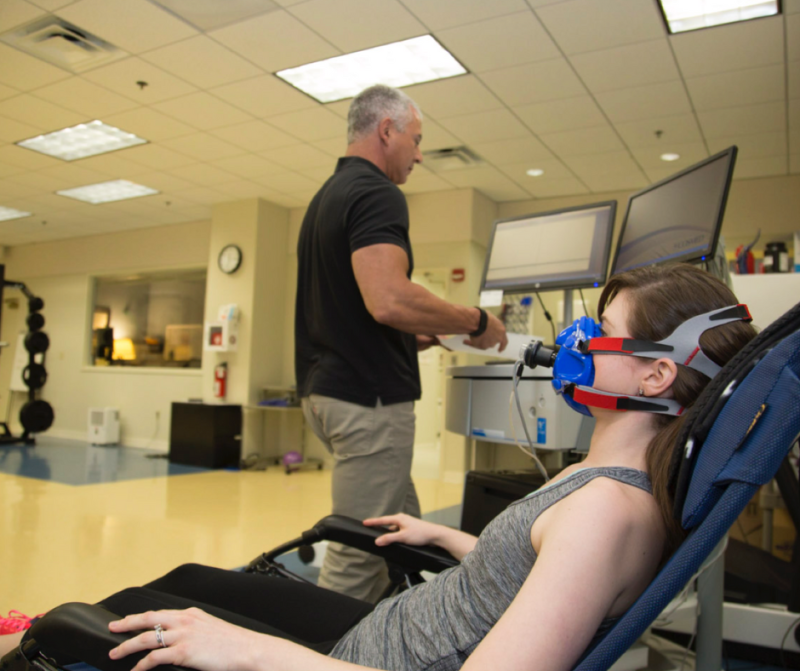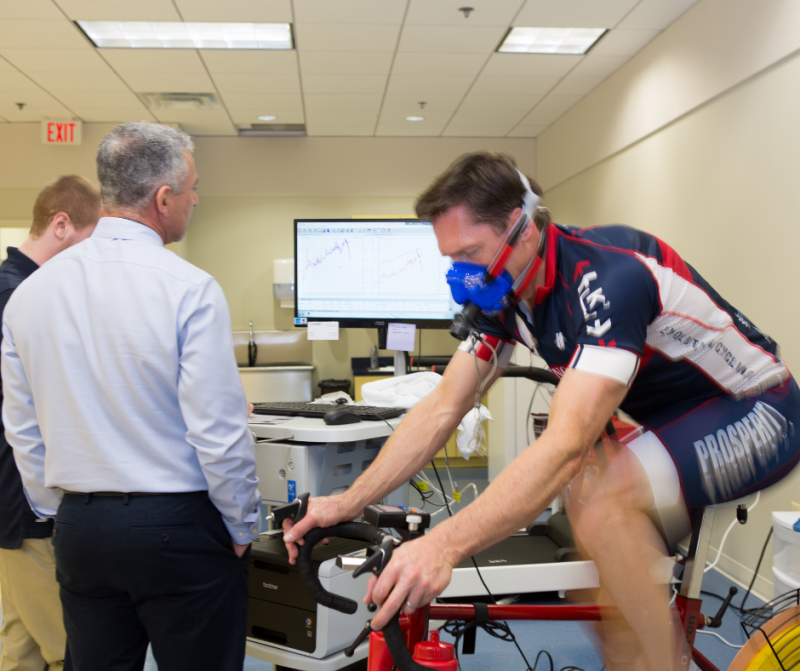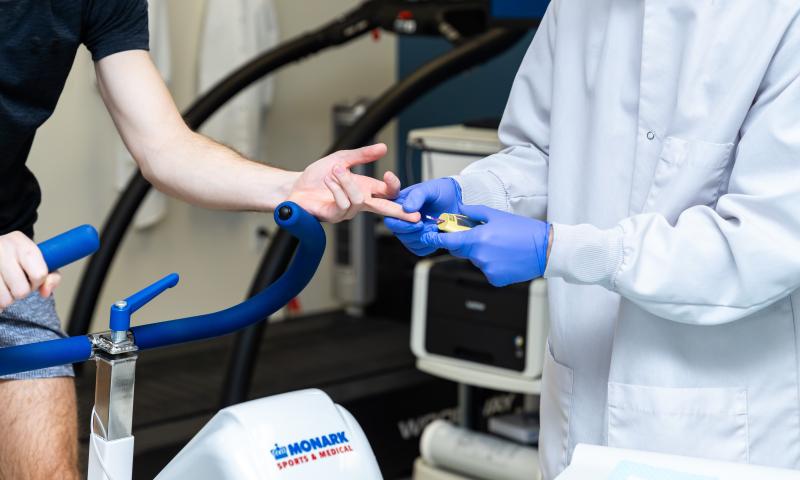Tests & Services
Body Composition | Metabolism | Performance
Body Composition
- DXA
DXA
Dual-energy X-ray Absorptiometry (DXA) is the gold standard for body composition assessment. The DXA scan uses a low-dose x-ray (less than 1% of a traditional chest x-ray) and provides information about bone mineral density, fat, lean, and fat-free mass in specific regions of the body with an accuracy of ±2%.
A DXA scan costs $200. We do not accept insurance. We offer various discounts for military, first responders, students, etc. Please click on "Scheduling" below to learn more.
Note: This test is suitable/equipped for persons up to 450lb.
This non-invasive test requires very little preparation. You may eat and drink normally the day of the test and may wear comfortable, loose-fitting clothing of your choosing, provided there are no metal zippers, large buttons, underwire clothing, etc. You will also be asked to remove any eyeglasses, jewelry, or other accessories prior to the test. If performing a second comparison test, it is advisable to follow similar pre-test procedures in terms of exercise and hydration. You will lie still on your back on the DXA table for approximately 10 minutes as the scanner arm passes over your body. You will receive a print-out and explanation of the test results at the end of the test.
DO:
- Eat and drink normally the day before testing.
- Wear loose-fitting, comfortable clothing without metal zippers, large buttons, underwire clothing, or other items containing metal. We recommended wearing lightweight clothes (short & t-shirt). Lockers rooms are available if you need to change clothes.
- Stop taking calcium supplements 24 hours before your test: This includes multivitamins as well as antacids such as TUMS (commonly used to treat heartburn).
DO NOT:
- Wear jewelry and/or eyeglasses during the test.
- Perform exercise within 12-24 hours of the test.
- If you had any radionuclides (dyes, contrasts, etc) within the last 2 weeks, you are not eligible to undergo a DXA until they have cleared the system.
- Women on their menstrual cycle should wait until they are not menstruating, as changes in fluid levels during this time can affect DXA results.
- The DXA test is suitable/equipped for persons up to 450 lbs.
- If you think you may be pregnant or are breastfeeding, you may not participate in the DXA, due to low dose x-ray exposure.
- If you had any radionuclides (dyes, contrasts, etc) within the last 2 weeks, you are not eligible to undergo a DXA until they have cleared the system.
- DXA + RMR Package
DXA + RMR Package
The combination of these assessments will give the individual a full picture of energy expenditure & body composition. These help guide the individual to caloric intake for weight loss, maintenance or gain and give a point of reference for body composition.
For the most optimal results, we recommend performing the RMR test in the morning after an overnight fast.
A DXA+RMR package costs $240. We do not accept insurance. We offer various discounts for military, first responders, students, etc. Please click on "Scheduling" below to learn more.
The two tests will take approximately 1 hour to complete. The Resting Metabolic Rate (RMR) test consists of sitting quietly for approximately 10 minutes, while breathing through a tube to collect your breath for gas analysis, yielding your estimated 24-hour caloric expenditure. For the most optimal results, we recommend performing the RMR test in the morning after an overnight fast. For the DXA, you will be asked to remove any eyeglasses, jewelry, or other accessories prior to the test. You will lie still on your back on the DXA table for approximately 10 minutes as the scanner arm passes over your body. You will receive a print-out and explanation of the test results at the end of each test.
DO:
- Eat and drink normally the day before the test.
- Fast for at least 8-12 hours prior to metabolism testing (water is fine). For the most optimal results, we recommend performing the RMR test in the morning after an overnight fast.
- Wear comfortable, loose-fitting clothing of your choosing, provided there are no metal zippers, large buttons, underwire clothing, etc. We recommended wearing lightweight clothes (short & t-shirt). Lockers rooms are available if you need to change clothes. You will also be asked to remove any eyeglasses, jewelry, or other accessories prior to the test.
- Stop taking calcium supplements 24 hours before your test: This includes multivitamins as well as antacids such as TUMS (commonly used to treat heartburn).
DO NOT:
- Consume caffeine the day of the test.
- Perform exercise within 12-24 hours of the test.
- If you had any radionuclides (dyes, contrasts, etc) within the last 2 weeks, you are not eligible to undergo a DXA until they have cleared the system.
- Women on their menstrual cycle should wait until they are not menstruating, as changes in fluid levels during this time can affect DXA results.
- The DXA test is suitable/equipped for persons up to 450 lbs.
- If you think you may be pregnant or are breastfeeding, you may not participate in the DXA, due to low dose x-ray exposure.
- If you had any radionuclides (dyes, contrasts, etc) within the last 2 weeks, you are not eligible to undergo a DXA until they have cleared the system.
- In-Body
In-Body
The bioelectrical impedance analysis (BIA) predicts body composition by sending a low-level current through the body to measure how well the body conducts electricity, which is an indicator of how much fat is present. The underlying premise of the procedure is that lean tissue (mostly water and electrolytes) is a good electrical conductor (i.e., has low impedance), whereas fat tissue is a poor conductor of electricity. The single frequency can also detect both intra- and extra-cellular fluid, resulting in a more accurate assessment.
An InBody test costs $100. We do not accept insurance. We offer various discounts for military, first responders, students, etc. Please click on "Scheduling" below to learn more.
During this relatively short duration test, a technician will ask you to remove your shoes and socks, record your height and weight and instruct you to stand on the InBody machine with your bare feet on the conductive surfaces and hands gripping the handles. An undetectable electrical current is sent though your body via the four points of contact. You will not feel this. The test is over in approximately one to two minutes. For me information on how to prepare for an InBody test, please watch this short video: https://www.youtube.com/watch?time_continue=311&v=uj_6tRImmYg&feature=emb_logo
DO:
- Drink enough fluids the day before the test to ensure normal hydration at the time of the test.
- For repeat testing, try to come in at the same time of day with the same food & hydration status to maintain uniformity. Fasted is best with a uniform amount of water consumption.
- We recommended wearing lightweight clothes (short & t-shirt). Lockers rooms are available if you need to change clothes.
DO NOT:
- Eat a meal or drink large amounts of fluid at least 2 to 3 hours before the test.
- Drink caffeine within 3 hours of the test
- Exercise within 12 hours before the test
- If you have a pacemaker of any kind, you are not able to participate in this test, as the electrical current could interfere with the device.
- If you are or think you may be pregnant or are breastfeeding, you may not participate in this test.
Metabolism
- Resting Metabolic Rate
Resting Metabolic Rate
The resting metabolic rate (RMR) is the amount of energy (calories) a body burns while at rest, which accounts for approximately 70% of the body's daily energy expenditure. This is the amount of energy needed to perform vital body functions such as respiration and circulation. RMR can vary with age, sex, fitness level, and lean body mass. Using gas analysis, we can measure an individual's RMR, which can be used to inform decisions regarding diet and exercise plans.
For the most optimal results, we recommend performing the RMR test in the morning after an overnight fast.
An RMR test costs $100. We do not accept insurance. We offer various discounts for military, first responders, students, etc. Please click on "Scheduling" below to learn more.
Arrive for testing fasted for at least 8-12 hours, no caffeine consumption or workout on the day of the test. The Resting Metabolic Rate (RMR) test consists of sitting quietly for approximately 10 minutes, while breathing through a tube that collects your breath for gas analysis, yielding your estimated 24-hour caloric expenditure.
DO:
- Eat and drink normally the day before the test.
- Fast for at least 8-12 hours prior to metabolism testing (water is fine). For the most optimal results, we recommend performing the RMR test in the morning after an overnight fast.
DO NOT:
- Consume caffeine the day of the test.
- Participate in a workout within 12-24 hours of the test.
If you take any daily medications (especially in the morning) please consult with our Laboratories Coordinator to discuss timing of medications - (202)994-2654 or email at istart
 gwu [dot] edu (istart[at]gwu[dot]edu).
gwu [dot] edu (istart[at]gwu[dot]edu).- DXA + RMR Package
DXA + RMR Package
The combination of these assessments will give the individual a full picture of energy expenditure & body composition. These help guide the individual to caloric intake for weight loss, maintenance or gain and give a point of reference for body composition.
For the most optimal results, we recommend performing the RMR test in the morning after an overnight fast.
A DXA+RMR package costs $240. We do not accept insurance. We offer various discounts for military, first responders, students, etc. Please click on "Scheduling" below to learn more.
The two tests will take approximately 1 hour to complete. The Resting Metabolic Rate (RMR) test consists of sitting quietly for approximately 10 minutes, while breathing through a tube to collect your breath for gas analysis, yielding your estimated 24-hour caloric expenditure. For the most optimal results, we recommend performing the RMR test in the morning after an overnight fast. For the DXA, you will be asked to remove any eyeglasses, jewelry, or other accessories prior to the test. You will lie still on your back on the DXA table for approximately 10 minutes as the scanner arm passes over your body. You will receive a print-out and brief explanation of the test results at the end of each test.
DO:
- Fast for at least 8-12 hours prior to metabolism testing. For the most optimal results, we recommend performing the RMR test in the morning after an overnight fast.
- Wear comfortable, loose-fitting clothing of your choosing, provided there are no metal zippers, large buttons, underwire clothing, etc. We recommended wearing lightweight clothes (short & t-shirt). Lockers rooms are available if you need to change clothes. You will also be asked to remove any eyeglasses, jewelry, or other accessories prior to the test.
- Stop taking calcium supplements 24 hours before your test: This includes multivitamins as well as antacids such as TUMS (commonly used to treat heartburn).
DO NOT:
- Consume caffeine the day of the test.
- Participate in a workout within 12-24 hours of the test.
- If you had any radionuclides (dyes, contrasts, etc) within the last 2 weeks, you are not eligible to undergo a DXA until they have cleared the system.
- Women on their menstrual cycle should wait until they are not menstruating, as changes in fluid levels during this time can affect DXA results.
- The DXA test is suitable/equipped for persons up to 450 lbs.
- If you think you may be pregnant or are breastfeeding, you may not participate in the DXA, due to low dose x-ray exposure.
- If you had any radionuclides (dyes, contrasts, etc) within the last 2 weeks, you are not eligible to undergo a DXA until they have cleared the system.
Performance
- Aerobic Fitness (VO2 Max)
Aerobic Fitness (VO2 Max)
A maximal graded exercise test (GXT) of endurance assesses aerobic fitness and can be performed on either a treadmill or cycle ergometer. Indirect calorimetry is used to measure maximal oxygen consumption (VO2max) and carbon dioxide production during exercise to exhaustion.
Cardiorespiratory fitness can also be estimated with a high degree of accuracy using submaximal exercise testing, with or without gas analysis. The procedure is similar to that of a maximal test, except the test is terminated when the subject reaches a predetermined heart rate or other termination criterion, and is often considered to be relatively safer and more comfortable than a maximal GXT.
A VO2max test costs $165. We do not accept insurance. We offer various discounts for military, first responders, students, etc. Please click on "Scheduling" below to learn more.
Prior to arriving for your test, you will need to complete the Physical Activity Readiness Questionnaire (PAR-Q), The Health Screening form and the Informed Consent form. We have locker rooms on-site should you need to use them to shower or change after the session (towels are not provided). You will need to wear comfortable athletic clothing for running or cycling, as well as shoes you know are suitable for the respective activity.
DO:
- Be sure to adequately hydrate the day before & day of the test.
- Be sure to properly fuel the night before & day of just as you would for a normal training session. Time your meals accordingly for the test. Larger meals should be consumed 1-2 hours before the test, whereas smaller snacks may be consumed 30 minutes prior to the test.
DO NOT:
- Participate in a heavy training session within 48 hours of the test.
Individuals with known cardiovascular health issues will not be allowed to participate in this test without the consent of a physician.
Please contact us directly to determine what test best suits your needs and to schedule. Call (202)994-2654 or email at istart
 gwu [dot] edu (istart[at]gwu[dot]edu).
gwu [dot] edu (istart[at]gwu[dot]edu).DO:
- Adequately hydrate for several days prior to testing.
- Wear/bring athletic clothing and sneakers.
- Consume a light, healthy snack 1-2 hours prior to testing (~200 calories with carbohydrates and protein).
DO NOT:
- Exercise immediately prior to testing.
- Engage in vigorous exercise 12-24 hours prior to testing.
- Eat a big meal immediately prior to testing.
- Note: This test is suitable/equipped for persons up to 300 lbs.
- Individuals with known cardiovascular health issues will not be allowed to participate in this test without the consent of a physician.
Please contact our Laboratories Coordinator to determine what test best suits your needs and to schedule. Call (202)994-5356 or email at istart
 gwu [dot] edu (istart[at]gwu[dot]edu)
gwu [dot] edu (istart[at]gwu[dot]edu)- Lactate Threshold
Lactate Threshold
The lactate threshold (LT) is the exercise intensity at which the muscle’s production of lactate is greater than the body’s ability to metabolize it. Knowing the LT is important primarily for endurance athletes who are interested in determining optimal training intensities. Traditionally, lactate threshold is determined by sampling lactate concentrations in the blood using a portable lactate analyzer during a maximal exercise test, and the results plotted against heart rate and exercise intensity. Determination of lactate threshold is often used as an acute marker of aerobic and anaerobic training adaptations. These test results are also used by qualified professionals to construct appropriate training program work intensity zones or thresholds for their clients or athletes.
A Lactate Threshold test costs $165. We do not accept insurance. We offer various discounts for military, first responders, students, etc. Please click on "Scheduling" below to learn more.
Prior to arriving for your test, you will need to complete the Physical Activity Readiness Questionnaire (PAR-Q), The Health Screening form and the Informed Consent form. We have locker rooms on-site should you need to use them to shower or change after the session (towels are not provided). You will need to wear comfortable athletic clothing for running or cycling, as well as shoes you know are suitable for the respective activity.
DO:
- Be sure to adequately hydrate the day before & day of the test.
- Be sure to properly fuel the night before & day of just as you would for a normal training session. Time your meals accordingly for the test. Larger meals should be consumed 1-2 hours before the test, whereas smaller snacks may be consumed 30 minutes prior to the test.
DO NOT:
- Participate in a heavy training session within 48 hours of the test.
Individuals with known cardiovascular health issues will not be allowed to participate in this test without the consent of a physician.
Please contact us directly to determine what test best suits your needs and to schedule. Call (202)994-2654 or email at istart
 gwu [dot] edu (istart[at]gwu[dot]edu)
gwu [dot] edu (istart[at]gwu[dot]edu)




